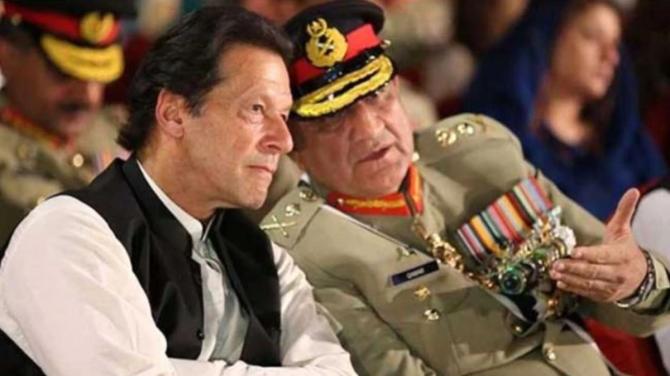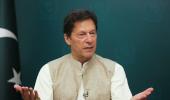As the people of Pakistan woke up to a new dawn on Sunday, the details of the gruelling and murky political activities in the preceding day and night have emerged, showing the country may have averted a damning showdown between ousted prime minister Imran Khan and the powerful Army.

According to various media reports, Khan made a botched attempt to replace Pakistan Army chief General Qamar Javed Bajwa in order to bring someone more pliant and sympathetic to his idea of foreign conspiracy and cling on to power.
BBC Urdu reported that a helicopter carrying two uninvited guests landed in the Prime Minister's House in the night and were escorted by Army soldiers to the interior of the palatial building.
They two met alone for 45 minutes with Khan.
No details were officially provided about the meeting but it was not held in a cordial atmosphere, the report said.
The prime minister had issued orders an hour ago to remove one of the high officials who came to meet him. So the uninvited arrival of these guests was unexpected for the prime minister.
Imran Khan was waiting for a helicopter but those arriving on the helicopter were against his estimate and expectations, according to the report.
It further said that Khan was expecting that the helicopter would bring his newly appointed official whose arrival would put down all political disturbance.
It also reported that the attempted effort for a change failed as the defence ministry did not issue the necessary notification for the new appointment.
The BBC did not identify the uninvited guest but the choice of words, tenor and tone of the report unmistakably show that they could be the Army chief General Bajwa and Inter-Services Intelligence (ISI) chief Lt Gen Nadeem Ahmed Anjum.
Pakistan has struggled with political instability since its formation in 1947 with multiple regime changes and military coups.
No prime minister has ever completed a full five-year term in office.
On Saturday, Khan became the first prime minister in Pakistan's history to be ousted in a no-confidence motion in the National Assembly.
It also reported that a petition was prepared by Advocate Adnan Iqbal to challenge the possible removal of Gen Bajwa as Army chief.
The Islamabad high court was opened in the night to take up the matter forthwith if the notification was issued by the ministry of defence.
Separately, The Express Tribune newspaper reported that an emergency petition was filed in the Islamabad high court (IHC) on Saturday night, seeking to restrain Prime Minister Khan from de-notifying Chief of Army Staff (COAS) Gen Bajwa.
The petition read that it was filed to 'uphold the enforcement and mandatory constitutional provision with regard to identification of term' of the Army chief.
The BBC report showed that the petition was ready but not filed for a technical reason as it needed the number of the official notification to change the Army chief, which eventually was not issued.
However, Khan in a meeting with a group of his favourite journalists, told them that there was no truth in the rumour that he was trying to replace the Army chief.
The truth is that the country was on the edge and survived a major crisis.
The Supreme Court also decided to open its gates and Chief Justice Umar Ata Bandial arrived at the apex court to immediately take action in a legal crisis.
The Opposition also prepared two petitions to file at the end of the deadline after midnight.
One petition was about the contempt of court by Speaker Asad Qaiser and other officials and another was for implementation of the court order to hold voting on the no-confidence motion.
Khan had been meeting his top officials and political advisors till the very end.
He held an emergency cabinet meeting and also met twice with Speaker Qaisar, who after coming back from the second meeting resigned at around 11.45 pm.
It paved the way for the voting before the end of the day as directed by the Supreme Court and averted the chaos.











 © 2025
© 2025